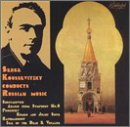| All Artists: Serge Koussevitzky Title: Conducts Russian Music Members Wishing: 0 Total Copies: 0 Label: Biddulph Records Release Date: 9/18/1997 Genre: Classical Styles: Opera & Classical Vocal, Chamber Music, Forms & Genres, Concertos, Theatrical, Incidental & Program Music, Historical Periods, Modern, 20th, & 21st Century, Instruments, Strings, Symphonies Number of Discs: 1 SwapaCD Credits: 1 UPC: 744718304523 |
Search - Serge Koussevitzky :: Conducts Russian Music
CD Details |
CD ReviewsWorth it for Die Toteninsel Alone! Interplanetary Funksmanship | Vanilla Suburbs, USA | 09/12/2004 (5 out of 5 stars) "Serge Koussevitzky is not a household name among classical music afficianados of today. He was once, though, and has quietly left his indelible imprint on two of our most cherished institutions of music, the Boston Symphony Orchestra and The Berkshire Music Center at Tanglewood, which he co-founded with Aaron Copland in 1935.
This disc embodies two of Koussevitzky's best performances with the Boston Symphony Orchestra, of which he was the musical director from 1924 until 1949, when he was replaced by the renowned French conductor, Charles Munch. Koussevitzky was a contemporary of Sergei Rachmaninoff's in many ways: Born just a year after Rachmaninoff, he was closely associated with him as well as Alexander Scriabin when both played under Rachmaninoff's baton at the Bolshoi Theatre in Moscow around the turn of the century. In 1909 when Koussevitzky, a double-bass player, made his conducting debut in Berlin, Rachmaninoff was the featured soloist on the concert bill. He also championed Rachmaninoff's works, performing many of them until he retired. Rachmaninoff's dark tone-poem Die Toteninsel is the closest the Russian romantic ever came to composing an "impressionist" piece. Through its 5/8 tempo, one can hear the slow lapping of the waters on the River Styx as the lone oarsman in Boecklin's painting inches the gondola of dead souls ever closer to the gates of Hades. It is a forboding piece, emcompassing the full range of emotions, from sadness, to fear, longing, passion and loss. Koussevitzky's baton does justice to Rachmaninoff's intent for the piece, and maintains an even-paced tempo which allows for the full range of orchestral colour to come to the fore. When horns announce the Dies Irae theme, timpani and low strings rush in behind, as engulfing as evil itself, sweeping away everything in its path. As the solo violin restates the opening theme wistfully, it is beautifully and bitterly picked up by the winds, which speak of love lost and of isolation, a sort of liebestod. Koussevitzky came from an era when conductors were not so concerned with conveying the "letter" of a composition as they were with its "spirit." By far, this is the most lyrical performance I've ever heard of Die Toteninsel. The sections of the Boston Symphony meld sumptuously with one another, maintaining an overall warm sonority which, while not sharply deliniated, does not come across as "muddied." The attacks are well-executed and flawless. Refrains and diminuendi fall away with the same emphasis with which their preceding climaxes were built. While many conductors break up the piece into its various sections, Koussevitzky's reading is more fluid, less "interpretive" and presents the piece as a unified, powerful, whole. The Vocalise is equally impressive. Taking an easy tempo, as do Eugene Ormandy's many performances, Koussevitzky paints a beautiful tonal portrait that reminds me of Bernard Herrmann's Scene d'amour from Hitchcock's Vertigo. Closing one's eyes, all that can be seen are a man and a woman, in an all-consuming embrace, as in Rodin's The Kiss. As for the recording itself, although pre-high fidelity, the sound is immediate and forceful, and clearly conveys the ambient acoustics of Boston's Symphony Hall. This 1945 recording is primitive by today's standards, yet clearly convincing. It does better justice to its subject than many poorly-made modern digital recordings. Unfortunately, very little of what Koussevitzky is available on RCA Red Seal today. Fortunately this one is available on a British independent label, Biddulph, catalog number WHL-045. Though the editing is seamlessly achieved from the original lacquer discs, it does sound as though Biddulph's re-recording engineers have used noise reduction methods which have clipped off much of the higher frequencies. My own 78 records - although scratched a bit - sound preferable to this remastering. However, do not let this drive you away; There is quite enough of the original recording intact to bring you hours of pleasure listening to Koussevitzky's ambient rendition of both these pieces. Die Toteninsel and Vocalise are accompanied by works by Shostakovich, Koussevitzky himself and an excellent rendering of Prokofief's Romeo and Juliet Suite. " |

